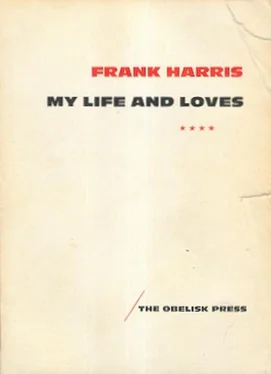Frank Harris - My Life And Loves, vol 5
Здесь есть возможность читать онлайн «Frank Harris - My Life And Loves, vol 5» весь текст электронной книги совершенно бесплатно (целиком полную версию без сокращений). В некоторых случаях можно слушать аудио, скачать через торрент в формате fb2 и присутствует краткое содержание. Жанр: Эротика, Секс, на английском языке. Описание произведения, (предисловие) а так же отзывы посетителей доступны на портале библиотеки ЛибКат.
- Название:My Life And Loves, vol 5
- Автор:
- Жанр:
- Год:неизвестен
- ISBN:нет данных
- Рейтинг книги:3 / 5. Голосов: 1
-
Избранное:Добавить в избранное
- Отзывы:
-
Ваша оценка:
- 60
- 1
- 2
- 3
- 4
- 5
My Life And Loves, vol 5: краткое содержание, описание и аннотация
Предлагаем к чтению аннотацию, описание, краткое содержание или предисловие (зависит от того, что написал сам автор книги «My Life And Loves, vol 5»). Если вы не нашли необходимую информацию о книге — напишите в комментариях, мы постараемся отыскать её.
My Life And Loves, vol 5 — читать онлайн бесплатно полную книгу (весь текст) целиком
Ниже представлен текст книги, разбитый по страницам. Система сохранения места последней прочитанной страницы, позволяет с удобством читать онлайн бесплатно книгу «My Life And Loves, vol 5», без необходимости каждый раз заново искать на чём Вы остановились. Поставьте закладку, и сможете в любой момент перейти на страницу, на которой закончили чтение.
Интервал:
Закладка:
In June 1913, the Kaiser celebrated the 25th anniversary of his ascension to the throne. The assemblage of kings and princes and all the notables of Germany gave a truly imperial color to the proceedings. The military pageant was very impressive. The unparalleled expansion of German commerce and manufacture owed something to his encouragement. In not a few departments, German science had achieved superiority over the rest of the world. The population had increased from 42 to 66 million. The birthrate, though decreasing, averaged 31 per 1,000 against 26 in England and 10 in France. Agriculture had prospered greatly and supplied Germany with 95 per cent of her necessary food, though prices had risen considerably. The German railways totaled 60,000 kilometers, 230,000 ships passed in and out of her harbors annually, and the commerce of Hamburg was exceeded only by that of London. In the production of sugar, Germany stood first with two million tons yearly, and potash was almost exclusively a German possession. More important still, in the production of iron, Germany was second only to the United States, in that of coal she took the third place after the United States and England. It was stated in the Reichstag that if the recent growth of trade could be maintained, Germany in this respect would surpass England in ten years and occupy the first place.
From the dismissal of Bismarck in 1890 till the World War in 1914, the chief figure in Europe was Kaiser Wilhelm the Second. When I met him, along with Edward, Prince of Wales, I was astonished by his rude authoritativeness.
Whoever wants to understand and to realize all the tragedy of the World War has only to read the book of Emil Ludwig entitled Kaiser Wilhelm II. It is not a great biography, but it is a most damning indictment. Ludwig shows that the Emperor really thought he could make himself the protector of Kruger and the Transvaal even at the cost of a war with England. He did not see that he could not have landed a single German soldier in the Transvaal against the will of the English. When he began building his battle fleet, avowedly to match the English, he did not see that the English would be forced to keep the upper hand in sea power. And if England left anything to chance, they would certainly be supported in the last resort by the enormous power and wealth of the United States.
For years he built upon the support of Russia and the personal friendship of the Tsar “Nicky,” though Bulow convinced him that Russia had entered into a close alliance with France.
In all history we have no record of so brainless a ruler. And yet Kaiser Wilhelm had a certain mental intelligence and charm of conversation. He was by nature an actor greedy of popular applause. I think of the charming letter he wrote to his grandmother, Queen Victoria, when he was forty years of age:
“How incredible it must seem to you that the tiny weeny little rat you so often had in your arms, and dear Grandpapa swung about in his napkin, has now reached the forties, just the half of your prosperous successful life. It is to be hoped you are not displeased with your impetuous colleague.”
And then think of his defiance:
“When Metternich frankly declared in July 1908 that the English Ministers were all for peace and only wanted a reciprocal diminution in the Navy Estimates, the Emperor was infuriated and wrote in the margin: 'A veiled threat! We will suffer no dictation! Ambassador has exceeded his instructions!' Further: 'It must be made clear to him that an arrangement with England at the expense of the fleet is no desire of mine. It is a piece of boundless impudence, a mortal insult to the German people and their Emperor; it must be imperatively and finally discountenanced. The Law will be carried out to the last fraction; whether Britain likes it or not is nothing to us. If they want war, let them begin itwe are not afraid! I must beg that the Ambassador will henceforth take no notice whatever of this kind of vaporing!'
Those who have read this book of Ludwig on the Kaiser will have to admit that Wilhelm was the chief cause of the war.
One curious fact should be recorded here. Ludwig traces Wilhelm's growth in conceit in a marvelous way. Very early on, Ballin wrote about Bulow: “Bulow is utterly ruining the Emperor; with his perpetual adulation, he is making him overestimate himself beyond all reason.”
The tide of flattery mounted steadily: In 1912, Lamprecht, Germany's leading historian, wrote of the Kaiser: “His is a personality of primitive potency, of irresistible authority, for which the whole domain of emotion and experience is perpetually opened anew, as for the soul of a creative artist. Self-reliance, fixity of purpose, ever directed to the loftiest aimsthose are the distinguishing marks of the Imperial personality.”
The Kaiser sucked it all in as Gospel. He wrote: “My subjects should always do what I tell them, but they will think for themselves and that's what makes all the trouble.”
Again and again Ludwig gives proof of the Kaiser's cowardice. He calls it “poltroonery,” but worst of all was his instability and his curious belief in the divine rights of monarchs. It seems to one reading this long exposure as if a King had to be specially designed by the Almighty in order to insure Germany's defeat in the World War.
The Kaiser made the navy which brought him the enmity of England, and when Tirpitz in December 1914 wanted to use it to blockade England, the Kaiser would not allow it. The English Admiral Sir Percy Scott admitted afterwards, however, that had the German fleet been used then as Tirpitz wanted: “England would have been forced to sue for peace in a month to avoid famine.”
The Kaiser not only provoked the war, but took care to wage it so that he must lose it. The war had altered England's position too. Her insularity was no longer a protection and though she did not seem to realize it, she had lost her pride of place to the United States, both as a world power and in business. And yet this was the country that, thanks to Sir Austin Chamberlain in 1927, refused to diminish the number of her cruisers and so spurred the American government to increase the United States Navy, as if in immediate fear of war.
June 1913, President Poincare paid a visit to England and was toasted everywhere as “a friend and ally.” Of course, it was a formal visit to King George, yet Poincare was the chief figure at the great review of English battleships at Portmouth.
Meanwhile peace conferences followed each other as if in derision. At the end of August 1913, a great Palace of Peace, due to the liberality of Andrew Carnegie, was opened at The Hague. It was the first universally recognized Temple of Peace and was praised in the press as a mark of “visible history.” First the Hague Peace Conference of 1899, and now this “pledge of peace universal and eternal” as the magazines called it. Mr. Van Swinderen, the head of the permanent Board of Arbitration, in his speech accepting the custody of the magnificent building, said: “No international controversies are so serious that they cannot be settled peaceably if both parties desire it.” It was asserted openly by the representatives of labor that the previous Peace Conference had been a failure because no one cared to propose that merchant ships should be immune in all wars.
The second Hague Conference held in 1907 had proposed that the third should be held in 1915 and that each nation should prepare a committee and charge it to make the proposals considered necessary. But in 1913 neither Russia nor England appointed such a committee. Clearly a pledge of universal and eternal peace needed better ratification than a splendid Temple. But Stead, the founder of the Review of Reviews and The War on War, the great apostle of peace, had unfortunately gone down with the Titanic in 1912. There was no one in England to take his place or work for peace as he had worked. One result was that in 1913-14, when the British expenditure on the Army and Navy had risen to?75,000,000, the expenditure on the Peace Conference was nil.
Читать дальшеИнтервал:
Закладка:
Похожие книги на «My Life And Loves, vol 5»
Представляем Вашему вниманию похожие книги на «My Life And Loves, vol 5» списком для выбора. Мы отобрали схожую по названию и смыслу литературу в надежде предоставить читателям больше вариантов отыскать новые, интересные, ещё непрочитанные произведения.
Обсуждение, отзывы о книге «My Life And Loves, vol 5» и просто собственные мнения читателей. Оставьте ваши комментарии, напишите, что Вы думаете о произведении, его смысле или главных героях. Укажите что конкретно понравилось, а что нет, и почему Вы так считаете.






![William Frith - John Leech, His Life and Work. Vol. 1 [of 2]](/books/747171/william-frith-john-leech-his-life-and-work-vol-thumb.webp)
![William Frith - John Leech, His Life and Work, Vol. 2 [of 2]](/books/748201/william-frith-john-leech-his-life-and-work-vol-thumb.webp)




